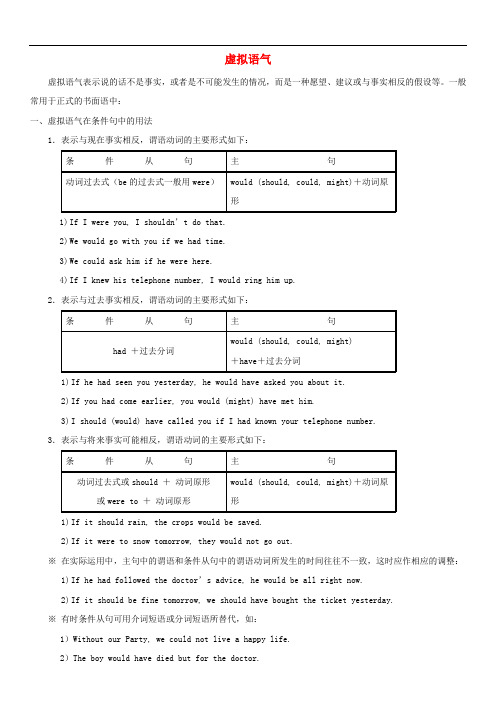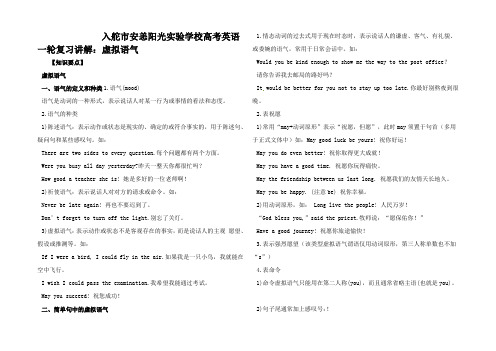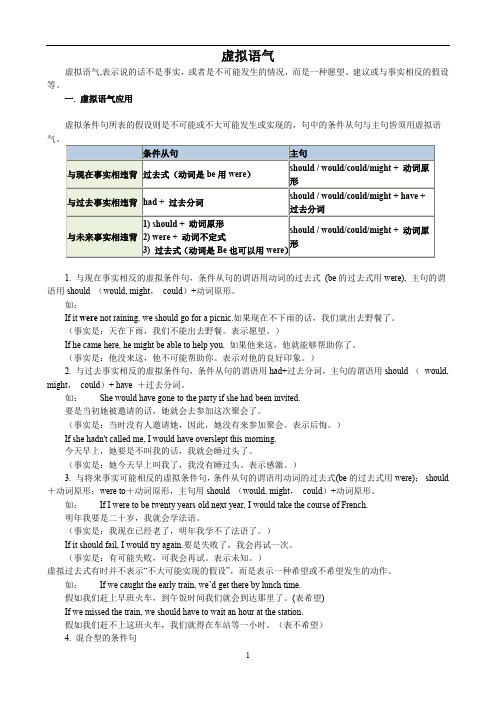高考英语一轮复习语法专题六虚拟语气讲解
高考英语语法虚拟语气精讲

高考英语语法虚拟语气精讲虚拟语气定义:用来表示说的话不是事实或不可能发生的情况,而是一种愿望,假设的语气考点一、状语从句中的虚拟语气(一)虚拟条件句中的时态呼应例句①If it should rain tomorrow, they_______(go)for an outing.②If we_______(have)three days off , we would enjoy a very happy life.③If I_______(take)your advice, I wouldn’t have made a mistake.④If he had been there, it_______(not happen).⑤Mary is ill today. If she were not ill, she_______(come)to school today.⑥I hadn’t studied hard so I_______(go)to Peking University. If I had gone to Peking University, I_______(work)in a big city.(二)虚拟语气倒装(三)含蓄虚拟条件句Sb did sth, if so/if not/ without/but for sth/doing和otherwise/or, SB would do/SB would have done , 例句:①She wasn’t feeling very well. Otherwise(if she had felt well),she _______ (notleave) the meeting so early.②But for your help(if you hadn’t helped me),I_______ (not finish) the work.③Without sunlight (if there were no sunlight), people’s life_______ (be) different from today.(四)as if状语/表语从句例句:①They talked as if they _______ (be)friends for years.②It seems as if it_______ (be) spring.考点二、名词性从句中的虚拟语气(一)宾语从句中的虚拟语气(1)表示要求,命令,建议的宾语从句一个坚持, insist两个命令, order, command四个建议, advise, suggest, propose,recommend五个要求, demand , require, request, desire, urge句式:sb suggest that sb (should) do例句:①The king ordered that the prisoners_______(kill)the next day.②They requested that we_______ (send) them to work there.③He insisted that I_______ (be) present.④We suggested that Tom_______(have)a rest.(2)表示“愿望”例句:①I would rather you_______ (return) the book yesterday.②I would rather you_______ (post) the letter right away.③If only I_______(can)see him again!④If only we_______(follow)your advice!⑤We wish our parents_______ (not punish) us.⑥I wish I (be)a bird.(现在)⑦I wish I (make) such a mistake.(二)主语从句中的虚拟语气(1)It is suggested, requested, ordered,proposed, demanded, advised, requreed that sb (should) do…例句:①It’s suggested that the plan_______ (carry)out.②It’s suggested that everybody_______ (buy)a dictionary.③It’s required that nobody_______ (smoke)here.(2)It’s necessary /strange/important /natural that sb should do……例句:①It is strange that she_______ (refuse)to come to the party.②It is important that we_______ ( master) a foreign language.(3)It is a pity/a shame/ no wonder that sb (should) do…例句:①It is a shame that little children_______(have)to beg in the street.②It is no wonder that she_______(not write)to you.(三)表语从句、同位语从句中的虚拟语气suggestion, proposal, requirement, order, advice , decision that sb should do ……suggestion, proposal, requirement, order, advice , decision is that sb should do ……例句:①My demand is that she_______(come)to see me once a week.②All of us are for the advice that the chemical factory_______(close)down.③He gave advice that they_______(help)each other.④My suggestion is that we_______(leave)at once.考点三、特殊句式的虚拟语气(一)例句:①It’s time that we_______(go)to bed.②It’s time that we_______(go)to bed.(二)should/could/need have done … but didn’t … 翻译“ ” 例句:①There was plenty of time. She_______(not hurry).②You_______(not be)late for yesterday’s class meeting as it was so important.(三)I (intend)to go to Tom’s birthday party, but I was not invited.。
高考英语一轮复习 语法点专题讲解 虚拟语气

虚拟语气虚拟语气表示说的话不是事实,或者是不可能发生的情况,而是一种愿望、建议或与事实相反的假设等。
一般常用于正式的书面语中:一、虚拟语气在条件句中的用法1.表示与现在事实相反,谓语动词的主要形式如下:1)If I were you, I shouldn’t do that.2)We would go with you if we had time.3)We could ask him if he were here.4)If I knew his telephone number, I would ring him up.表示与过去事实相反,谓语动词的主要形式如下:2.1)If he had seen you yesterday, he would have asked you about it.2)If you had come earlier, you would (might) have met him.3)I should (would) have called you if I had known your telephone number.3.表示与将来事实可能相反,谓语动词的主要形式如下:1)If it should rain, the crops would be saved.2)If it were to snow tomorrow, they would not go out.※ 在实际运用中,主句中的谓语和条件从句中的谓语动词所发生的时间往往不一致,这时应作相应的调整:1)If he had followed the doctor’s advice, he woul d be all right now.2)If it should be fine tomorrow, we should have bought the ticket yesterday.※ 有时条件从句可用介词短语或分词短语所替代,如:1)Without our Party, we could not live a happy life.2)The boy would have died but for the doctor.3)Given more time, I could have finished the work remarkably.※ 虚拟条件句往往可以省略if, 采取将had, should, were提到句首的倒装句式表达。
高考英语语法:虚拟语气讲义

虚拟语气虚拟语气表示动作或状态与事实相反,或不可能发生的情况。
一、虚拟语气用于条件状语从句中从句主句与现实事实相反一般过去式(be--were)Should/would/could/might + V原与过去事实相反Had + done Should/would/could/might +have done与将来事实相反过去式;should+V 原;were to + V原Should/would/could/might + V原1. 表示与现在事实相反或不可能发生:条件状语从句:一般过去时(虚拟语气中be→were)主句用:would(should, could, might)+动词原形。
If we had time now, we would read it again.If I were you, I would work hard.2. 表示与过去事实相反或不可能发生:条件状语从句:had+过去分词;主句:would(should, could, might)+have+过去分词。
If he had taken my advice, he would have succeeded in the test.If I had known your telephone number then, I would have called you.3. 表示与将来的事实可能相反或不可能发生:条件状语从句:①一般过去时②should +动词原形③were to+动词原形;主句:would(should, could, might)+动词原形。
If it should rain, the crops would be saved.If it were to snow tomorrow, they would not go out.例句:If there were no subjunctive mood, English ( ) much easier to learn. (B)A. could have beenB. would beC. will beD. would have been(2)省略if的虚拟语气如果从句中含有were/ should/ had时,则可以把这三个词置于句首,省略if.采用倒装语序。
高考英语一轮复习 虚拟语气讲解

入舵市安恙阳光实验学校高考英语一轮复习讲解:虚拟语气【知识要点】虚拟语气一、语气的定义和种类1.语气(mood)语气是动词的一种形式,表示说话人对某一行为或事情的看法和态度。
2.语气的种类1)陈述语气:表示动作或状态是现实的、确定的或符合事实的,用于陈述句、疑问句和某些感叹句。
如:There are two sides to every question.每个问题都有两个方面。
Were you busy all day yesterday?昨天一整天你都很忙吗?How good a teacher she is! 她是多好的一位老师啊!2)祈使语气:表示说话人对对方的请求或命令。
如:Never be late again! 再也不要迟到了。
Don’t forget to turn off the light.别忘了关灯。
3)虚拟语气:表示动作或状态不是客观存在的事实,而是说话人的主观愿望、假设或推测等。
如:If I were a bird, I could fly in the air.如果我是一只小鸟,我就能在空中飞行。
I wish I could pass the examination.我希望我能通过考试。
May you succeed! 祝您成功!二、简单句中的虚拟语气1.情态动词的过去式用于现在时态时,表示说话人的谦虚、客气、有礼貌、或委婉的语气,常用于日常会话中。
如:Would you be kind enough to show me the way to the post office ?请你告诉我去邮局的路好吗?It would be better for you not to stay up too late.你最好别熬夜到很晚。
2.表祝愿1)常用“may+动词原形”表示“祝愿,但愿”,此时may须置于句首(多用于正式文体中)如:May good luck be yours! 祝你好运!May you do even better! 祝你取得更大成就!May you have a good time. 祝愿你玩得痛快。
虚拟语气语法讲解课件 2023届高考英语一轮复习

句型“It is (high/about) time that...”中,从句的谓语动词用过去式
“ should+动词原形”(should不能省略)。如:It is high time that
虚
拟
语
气
虚拟语气是什么?
虚拟语气是指把动作当作一种只存在于讲话人想象中的“假设”或 “推测”而不是当作客观事实;它表达的是怀疑、忧虑、推测、假设、 想象和祝愿等。
英语中的语气有三种:
陈述语气
祈使语气
虚拟语气
01
虚拟语气在 非真实条件 句中的应用
3
运用规则
条件从句谓语动词
主句谓语动词
与现在事实相 反
did / (be动词用were)
would+could+should+might+动 词原形
与过去事实相 反
had done
would+could+should+might+hav e done
与将来事实相 动词过去式 / should+动词 would+could+should+might+动
反
we should leave for the train station. (6)在if only(要是··...·就 好了)和 would rather 后面的从句中,若表示现在没有实现愿望, 谓语动词用一般过去时;若表示过去未实现的愿望,谓语动词
用过去完成时。如:If only I were a tree.
【语法讲解】高中英语--虚拟语气专题讲解(详细)

虚拟语气
知识导图
虚拟语气的定义:虚拟语气表示说话人的某种愿望、假设、怀疑、猜测和建议等,表示的是纯属假设或实现的可能性不大的情况。
虚拟语气是由句中的谓语的特殊形式表现出来的。
虚拟语气的用法
1.虚拟语气用于条件句(条件状语从句)
①条件句的分类
条件句可以分为两种:真实条件句和虚拟条件句。
真实条件句是一种可能实现的条件句,且实现的可能性非常大。
在条件句中常用表示现在的某种时态代替表示将来的时态。
If I have time, I’ll come over to see you.
虚拟条件句是一种表示不能实现或实现的可能性很小的条件句。
其谓语动词用虚拟语气。
If I had time, I should/would/could come over to see you.
②用法。
高考英语一轮复习(语法)-虚拟语气

高考英语一轮复习(语法)——虚拟语气一、语气的定义和种类l、语气:语气是动词的一种形式,它表示说话人对某一行为或事情的看法和态度。
2、语气的种类:(1)陈述语气: 表示动作或状态是现实的、确定的或符合事实的,用于陈述句、疑问句和某些感叹句。
如:We are not ready. 我们没准备好。
What a fine day it is!多好的天气啊!(2)祈使语气: 表示说话人的建议、请求、邀请、命令等。
如: Open the door, please。
请打开门。
(3)虚拟语气: 表示动作或状态不是客观存在的事实,而是说话人的主观愿望、假设或推测等。
如: If I were you, I should study English. 如果我是你,我就学英语了。
May you succeed! 祝您成功!二、虚拟语气在条件从句中的用法条件句有两类,一类是真实条件句,一类是虚拟条件句。
如果假设的情况是有可能发生的,就是真实条件何。
在这种真实条件句中的谓语用陈述语气。
如: If it doesn’t rain tomorrow, we will go to the park. 如果明天不下雨,我们就去公园。
如果假设的情况是过去或现在都不存在的,或将来不大可能发生的,则是虚拟条件句。
如: I f he had seen you yesterday, he would have asked you about it. 如果他昨天见到你,他会问你这件事的。
(事实上他昨天没见到你,因此也未能问你这件事。
)在含有虚拟条件句的复合句中,主句和从句的谓语都要用虚拟语气。
现将虚拟条件从句和主句的动词形式列表如下:从句主句与现在事实相反动词的过去式(be的过去式一般用were) would/ should/ could/ might + 动词原形与过去事实相反 had + 过去分词 would/ should/ could/ might + have + 过去分词与将来事实相反动词过去式,should + 动词原形,were to + 动词原形 would/ should/ could/ might + 动词原形注: 主句中的should只用于I、we,但在美国英语中,should常被would代替;从句中的should 可用于各种人称。
高考英语英语语法一轮复习——虚拟语气讲解

虚拟语气虚拟语气,表示说的话不是事实,或者是不可能发生的情况,而是一种愿望、建议或与事实相反的假设等。
一. 虚拟语气应用虚拟条件句所表的假设则是不可能或不大可能发生或实现的,句中的条件从句与主句皆须用虚拟语1. 与现在事实相反的虚拟条件句,条件从句的谓语用动词的过去式(be的过去式用were), 主句的谓语用should (would, might,could)+动词原形。
如:If it were not raining, we should go for a picnic.如果现在不下雨的话,我们就出去野餐了。
(事实是:天在下雨,我们不能出去野餐。
表示愿望。
)If he came here, he might be able to help you. 如果他来这,他就能够帮助你了。
(事实是:他没来这,他不可能帮助你。
表示对他的良好印象。
)2. 与过去事实相反的虚拟条件句,条件从句的谓语用had+过去分词,主句的谓语用should (would, might,could)+ have +过去分词。
如:She would have gone to the party if she had been invited.要是当初她被邀请的话,她就会去参加这次聚会了。
(事实是:当时没有人邀请她,因此,她没有来参加聚会。
表示后悔。
)If she hadn't called me, I would have overslept this morning.今天早上,她要是不叫我的话,我就会睡过头了。
(事实是:她今天早上叫我了,我没有睡过头。
表示感激。
)3. 与将来事实可能相反的虚拟条件句,条件从句的谓语用动词的过去式(be的过去式用were);should +动词原形;were to+动词原形,主句用should (would, might,could)+动词原形。
如:If I were to be twenty years old next year, I would take the course of French.明年我要是二十岁,我就会学法语。
- 1、下载文档前请自行甄别文档内容的完整性,平台不提供额外的编辑、内容补充、找答案等附加服务。
- 2、"仅部分预览"的文档,不可在线预览部分如存在完整性等问题,可反馈申请退款(可完整预览的文档不适用该条件!)。
- 3、如文档侵犯您的权益,请联系客服反馈,我们会尽快为您处理(人工客服工作时间:9:00-18:30)。
专题六虚拟语气
一、虚拟语气在条件句中的用法
1、基础用法
(1)若表示在某一假设的条件下,必然而然就会发生某事,第一人称可用should或would, 而二、三人称只用would.
(2)若表示在某一假设条件下就能够干某事,各人称都用could.
(3)如果表示在某种假设条件下有可能会发生某事,各人称都用might.
3.虚拟语气的倒装
当虚拟条件句中含有were,had,should,could等动词时,可以将if省略,然后将were,had,should,
could 等词移至句首。
注意:以上移至句首的had不一定是助动词,如果是实义动词也可倒装:
If he had money,he would buy a car. Had he money,he would buy a car.
4.错综虚拟语气(主从句指的是不同的时间,根据上下文的意思采用不同的谓语动词形式)
常见的两种错综虚拟语气:
(1)从句与过去事实相反相成,而主句与现在事实相反。
例如:
If you had not been strict with me when I was young, I could not be such a successful person now.(这种虚拟语气的特点是主句中常含有时间准状语now 或nowadays)
(2)Should anyone come and ask for me, tell them I will come back tomorrow.
(主句为祈使句,条件句与将来事实相反,表示说话人认为某件事情发生的可能性很小。
)
5.含蓄虚拟条件句
含蓄虚拟条件句是指句中没有明显的虚拟条件句,而是利用其他手段来暗示存在虚拟条件。
这类用法
主要见于以下七种方式:
(1)将条件隐含在不定式短语中。
I should be happy to go with you. (=I should be happy if I could go with you.)
(2)将条件隐含在分词短语中。
Born in better times, he would have been a scholar. (=If he had been born in better times, he …)
(3)将条件隐含在介词短语中。
Without air, no one could live. (=If there were no air, no one could live.)
常用的介词或介词短语,如but for, but that, without, in case of, under, under more favorable condition等。
(4)将条件隐含在名词短语中。
A true friend would not have betrayed me. (=If he had been a true friend, he
would…)
(5)将条件隐含在某些连词(如or, or else, otherwise等)中。
用法如下:它们后的句子如果说的不是
客观事实,它们前边的句子采用陈述语气,后边的句子采用虚拟语气。
(a)句子(一般现在时)+ or, or else, otherwise + 句子(谓语部分:should\would\could\might等+ 动词原形)
(b)句子(一般过去时)+ or, or else, otherwise + 句子(谓语部分:
should\would\could\might等+ have done)
(6)将条件隐含在一定的上下文中。
Don’t bother to read all these papers. It would take too long.
(=…If you read all these papers, it would take too long)
常用来表示含蓄虚拟条件的手段连词如:so that, unless, in case, supposing, lest, provided,for
fear that, on condition that, if only等。
(注:lest, for fear that和in case引起的从句中谓语动词多用should+动词原形,但可以不用虚拟语
气,而用动词的陈述语气形式。
)
注意:but后面转折成真实情况的用法
例:I would have bought it yesterday, but I had no money.
二、虚拟语气在名词性从句中的应用
1、主语从句中的虚拟语气:It is +形容词/动词的过去分词/名词+主语从句的结构中,
从句的谓语动
词须用动词原形或should +do的形式
常用的这类词有:形容词:advisable、natural、anxious、necessary、better、regretful、desirable、
strange、surprising、important过去分词:decided、recommended、demanded、requested、desired、
required、ordered、suggested名词:duty、pity、no surprise、regret、no wonder、shame
2、宾语从句中的虚拟语气
(1)wish后的宾语从句
wish(that)+ did/were(would/should do) 表示与现在或将来相反
Had done(would/should have done) 表示与过去相反
(2)某些动词表示愿望、要求、建议和命令等。
从句形式为:(should)+动词原形
常用的动词有:advise、order、command、decide、propose、demand、recommend、request、require、insist、suggest、urge
注意:insist表示“坚持认为,坚持说”时,从句中不用虚拟语气;表示“坚持要求”时,从句用虚拟语气。
suggest表示“暗示,表明”时,从句不用虚拟语气;表示“建议”时,从句用虚拟语气。
3、表语从句和同位语从句中的虚拟语气
表示建议、命令、主张、目的和愿望等名词后面的表语从句或同位语从句中用虚拟语气。
其形式为:(should)+动词原形。
常用的名词有:advice、preference、demand、proposal、desire、request、requirement、necessity、order、suggestion
三、虚拟语气的特殊句型
1、would rather后句子用虚拟语气:would rather后接句子时,句子谓语习惯上要用虚拟语气,具体用法为:
a.一般过去时表示现在或将来的愿望
b. 用过去完成时表过去的愿望
2、It’s(about/high)time后后的从句用虚拟语气:从句谓语通常用过去式表示现在或将来,有时也用过去进行时或“should+动词原形”(should不能省略),其意为“(早)该干某事了”,暗含“现在做这件事稍微有点迟。
”
注意:若从句中出现be动词,不能用was,要用were。
3、as if(though)引起的方式状语从句和表语要使用虚拟语气(从句中动词形式与wish宾语从句的形式相同)
4、If only 表示“但愿……,要是……就好了”(从句中动词形式与wish宾语从句的形式相同)
5、由连接词in case, so that, unless, lost, for fear that引起的状语从句中,谓语动词要用虚拟形式,即should(might, would)+动词原形。
